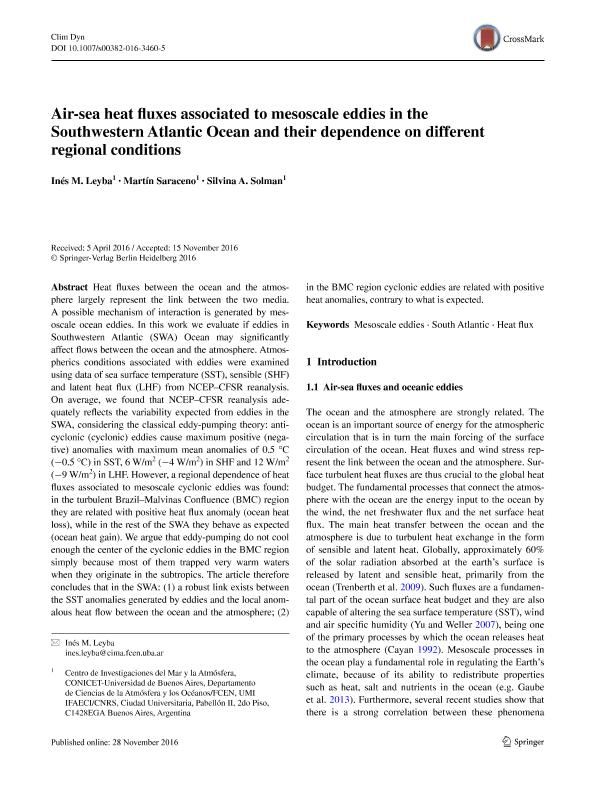Mostrar el registro sencillo del ítem
dc.contributor.author
Leyba, Inés Mercedes

dc.contributor.author
Saraceno, Martin

dc.contributor.author
Solman, Silvina Alicia

dc.date.available
2018-09-10T17:23:30Z
dc.date.issued
2017-10
dc.identifier.citation
Leyba, Inés Mercedes; Saraceno, Martin; Solman, Silvina Alicia; Air-sea heat fluxes associated to mesoscale eddies in the Southwestern Atlantic Ocean and their dependence on different regional conditions; Springer; Climate Dynamics; 49; 7-8; 10-2017; 2491-2501
dc.identifier.issn
0930-7575
dc.identifier.uri
http://hdl.handle.net/11336/58910
dc.description.abstract
Heat fluxes between the ocean and the atmosphere largely represent the link between the two media. A possible mechanism of interaction is generated by mesoscale ocean eddies. In this work we evaluate if eddies in Southwestern Atlantic (SWA) Ocean may significantly affect flows between the ocean and the atmosphere. Atmospherics conditions associated with eddies were examined using data of sea surface temperature (SST), sensible (SHF) and latent heat flux (LHF) from NCEP–CFSR reanalysis. On average, we found that NCEP–CFSR reanalysis adequately reflects the variability expected from eddies in the SWA, considering the classical eddy-pumping theory: anticyclonic (cyclonic) eddies cause maximum positive (negative) anomalies with maximum mean anomalies of 0.5 °C (−0.5 °C) in SST, 6 W/m2 (−4 W/m2) in SHF and 12 W/m2 (−9 W/m2) in LHF. However, a regional dependence of heat fluxes associated to mesoscale cyclonic eddies was found: in the turbulent Brazil–Malvinas Confluence (BMC) region they are related with positive heat flux anomaly (ocean heat loss), while in the rest of the SWA they behave as expected (ocean heat gain). We argue that eddy-pumping do not cool enough the center of the cyclonic eddies in the BMC region simply because most of them trapped very warm waters when they originate in the subtropics. The article therefore concludes that in the SWA: (1) a robust link exists between the SST anomalies generated by eddies and the local anomalous heat flow between the ocean and the atmosphere; (2) in the BMC region cyclonic eddies are related with positive heat anomalies, contrary to what is expected.
dc.format
application/pdf
dc.language.iso
eng
dc.publisher
Springer

dc.rights
info:eu-repo/semantics/openAccess
dc.rights.uri
https://creativecommons.org/licenses/by-nc-sa/2.5/ar/
dc.subject
Heat Flux
dc.subject
Mesoscale Eddies
dc.subject
South Atlantic
dc.subject.classification
Meteorología y Ciencias Atmosféricas

dc.subject.classification
Ciencias de la Tierra y relacionadas con el Medio Ambiente

dc.subject.classification
CIENCIAS NATURALES Y EXACTAS

dc.title
Air-sea heat fluxes associated to mesoscale eddies in the Southwestern Atlantic Ocean and their dependence on different regional conditions
dc.type
info:eu-repo/semantics/article
dc.type
info:ar-repo/semantics/artículo
dc.type
info:eu-repo/semantics/publishedVersion
dc.date.updated
2018-09-07T13:45:54Z
dc.journal.volume
49
dc.journal.number
7-8
dc.journal.pagination
2491-2501
dc.journal.pais
Alemania

dc.journal.ciudad
Berlin
dc.description.fil
Fil: Leyba, Inés Mercedes. Consejo Nacional de Investigaciones Científicas y Técnicas. Oficina de Coordinación Administrativa Ciudad Universitaria. Centro de Investigaciones del Mar y la Atmósfera. Universidad de Buenos Aires. Facultad de Ciencias Exactas y Naturales. Centro de Investigaciones del Mar y la Atmósfera; Argentina
dc.description.fil
Fil: Saraceno, Martin. Consejo Nacional de Investigaciones Científicas y Técnicas. Oficina de Coordinación Administrativa Ciudad Universitaria. Centro de Investigaciones del Mar y la Atmósfera. Universidad de Buenos Aires. Facultad de Ciencias Exactas y Naturales. Centro de Investigaciones del Mar y la Atmósfera; Argentina
dc.description.fil
Fil: Solman, Silvina Alicia. Consejo Nacional de Investigaciones Científicas y Técnicas. Oficina de Coordinación Administrativa Ciudad Universitaria. Centro de Investigaciones del Mar y la Atmósfera. Universidad de Buenos Aires. Facultad de Ciencias Exactas y Naturales. Centro de Investigaciones del Mar y la Atmósfera; Argentina
dc.journal.title
Climate Dynamics

dc.relation.alternativeid
info:eu-repo/semantics/altIdentifier/doi/https://dx.doi.org/10.1007/s00382-016-3460-5
dc.relation.alternativeid
info:eu-repo/semantics/altIdentifier/url/https://link.springer.com/article/10.1007/s00382-016-3460-5
Archivos asociados
